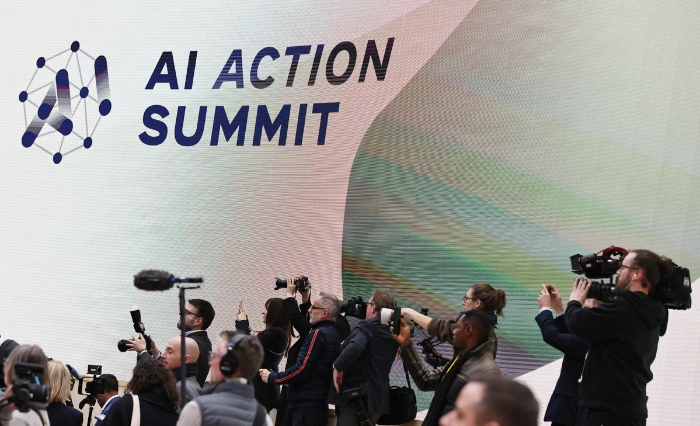China seeks AI growth benefiting all
Nation committed to actively promoting development, governance of key tech
2025-02-13 08:54:13 | Author: CAO DESHENG | Source:www.chinadaily.com.cn 2025-02-13

Journalists work during the Artificial Intelligence Action Summit, at the Grand Palais, in Paris, France, on Feb 11, 2025. [Photo/Xinhua]
As the United States was absent from a collective pledge to drive inclusive AI development at the Artificial Intelligence Action Summit in Paris, France, the China-proposed Global AI Governance Initiative, put forward by President Xi Jinping in 2023, has greater relevance to promoting AI growth for good and for all, according to analysts.
Fifty-eight countries including China and two international organizations — the 27-member European Union and the 55-member African Union — signed the Statement on Inclusive and Sustainable Artificial Intelligence for People and the Planet at the summit, co-chaired by France and India from Monday to Tuesday.
The US refused to sign the international document, with Vice-President JD Vance making it clear at the summit that Washington maintains an "America first" approach in AI development.
Vance said that the US administration will ensure that "American AI technology continues to be the gold standard worldwide", while access to that technology will not be open to all, according to media reports.
Addressing the summit in the capacity of President Xi's special representative, Vice-Premier Zhang Guoqing reiterated China's commitment to working with other countries to promote development, safeguard security, share achievements in the AI field, and jointly build a community with a shared future for mankind.
In facing the opportunities and challenges brought about by the development of AI, Zhang called on the international community to jointly advocate the principle of developing AI for good and to deepen innovative cooperation, strengthen inclusiveness and universal benefits, and improve global governance.
Zhang's attendance at the Paris summit is widely considered as China's active implementation of the Global AI Governance Initiative. Foreign Ministry spokesman Guo Jiakun said on Wednesday that China's signing of the outcome document at the summit demonstrates its commitment to promoting global AI development and governance in an active manner.
"China will continue to uphold the principle of extensive consultation and joint contribution with benefits shared by all, strengthen exchanges and cooperation with all parties, and promote artificial intelligence to better serve global development and enhance the wellbeing of humanity," Guo said at a regular news conference.
The Global AI Governance Initiative called on countries to work together to prevent risks and develop AI governance frameworks, norms and standards based on broad consensus, in order to make AI technologies more secure, reliable, controllable and equitable.
On July 1 last year, the 78th United Nations General Assembly adopted a China-led resolution on enhancing international AI cooperation, with over 140 countries supporting it. This resolution, which was the UN's first on international cooperation for AI capacity building, fully embodies the core principles of the Global AI Governance Initiative, and aligns with the high expectations of numerous UN member states, particularly developing countries.
Yasir Habib Khan, president of the Institute of International Relations and Media Research in Pakistan, said that in the fast-evolving AI economy, China has emerged as a key player, offering great opportunities for developing nations, especially the Global South, to help them keep pace with global technological progress.
Through international cooperation mechanisms, such as the UN and the digital Silk Road initiative, China advocates AI policies that reflect the interests of developing nations, Khan said, adding that its emphasis on national sovereignty in AI governance ensures that emerging economies maintain control over their data and technological resources.
The Paris summit, gathering heads of state and government, leaders of international organizations, business executives and tech experts, took place as Chinese AI company DeepSeek surprised the global AI landscape.
DeepSeek, which built its open-source AI model at a fraction of the cost of building similar large language models and with fewer chips, has reduced financial barriers for global AI participation and promoted a more level playing field through technological advancements.
Andy Mok, a senior research fellow at the Center for China and Globalization, said that DeepSeek exemplifies China's broader vision to provide global public goods — a model that reimagines technology as a universal resource for the benefit of all.
The Chinese company's success exposes the fragility of the narrative that only the US model, with its emphasis on individualism and laissez-faire economics, can foster progress, Mok said in an opinion piece published on the website of the China Global Television Network.
While hailing China's progress in AI development and its initiative for global AI governance, global leaders attending the Paris summit underlined the need for international cooperation on AI development.
UN Secretary-General Antonio Guterres warned that the growing concentration of AI capabilities risks deepening geopolitical divides, adding that "while some companies and countries are racing ahead with record investments, most developing nations find themselves left out in the cold".
"We must prevent a world of AI 'haves' and 'have-nots'. We must all work together so that AI can bridge the gap between developed and developing countries — not widen it," he said.
